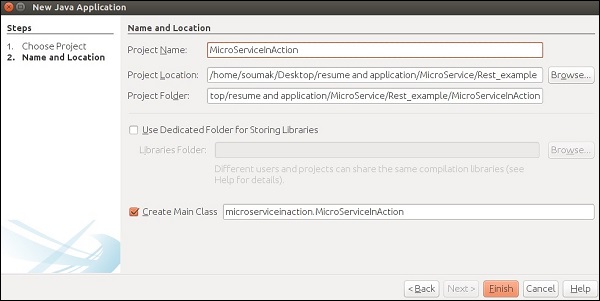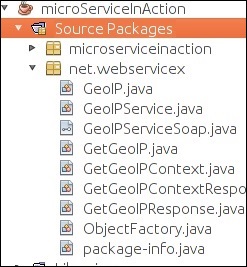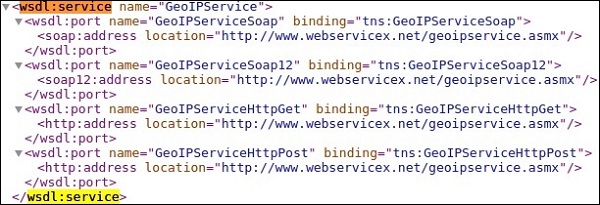마이크로 서비스 아키텍처-실습 MSA
이 장에서는 사용 가능한 다양한 서비스를 사용하는 하나의 마이크로 서비스 애플리케이션을 빌드합니다. 우리는 마이크로 서비스가 애플리케이션을 구축하는 비용 효율적인 방법이 아니라는 것을 알고 있습니다. 우리가 구축하는 모든 서비스는 본질적으로 풀 스택이 될 것입니다. 로컬 환경에서 마이크로 서비스를 구축하려면 특정 시점에 사용할 수 있도록 서버 인스턴스 4 개를 계속 실행해야하므로 고급 시스템 구성이 필요합니다. 최초의 마이크로 서비스를 구축하기 위해 사용 가능한 SOA 엔드 포인트 중 일부를 사용하고 애플리케이션에서 동일한 것을 사용합니다.
시스템 구성 및 설정
빌드 단계를 진행하기 전에 그에 따라 시스템을 준비하십시오. 일부 공용 웹 서비스가 필요합니다. 이를 위해 쉽게 Google을 검색 할 수 있습니다. SOAP 웹 서비스를 사용하려면 하나의 WSDL 파일을 가져 오며 여기에서 특정 웹 서비스를 사용해야합니다. REST 서비스의 경우 동일한 링크를 사용하려면 하나의 링크 만 필요합니다. 이 예에서는 하나의 응용 프로그램에서 세 가지 웹 서비스 "SOAP", "REST"및 "custom"을 잼하게됩니다.
애플리케이션 아키텍처
마이크로 서비스 구현 계획을 사용하여 Java 애플리케이션을 생성합니다. 사용자 지정 서비스를 만들고이 서비스의 출력이 다른 서비스에 대한 입력으로 작동합니다.
다음은 마이크로 서비스 애플리케이션을 개발하기 위해 따라야 할 단계입니다.
Step 1: Client creation for SOAP service− 웹 서비스를 배우는 데 사용할 수있는 많은 무료 웹 API가 있습니다. 이 자습서의 목적을 위해 ""의 GeoIP 서비스를 사용합니다.http://www.webservicex.net/.”WSDL 파일은 웹 사이트 " webservicex.net "의 다음 링크에서 제공됩니다 . 이 WSDL 파일에서 클라이언트를 생성하려면 터미널에서 다음 명령을 실행하기 만하면됩니다.
wsimport http://www.webservicex.net/geoipservice.asmx?WSDL이 명령은 "SEI"라는 이름의 폴더 아래에 필요한 모든 클라이언트 파일을 생성합니다.이 폴더는 서비스 끝점 인터페이스의 이름을 따서 명명됩니다.
Step 2: Create your custom web service−이 튜토리얼의 이전 단계에서 언급 한 동일한 프로세스를 따르고 "CustomRest"라는 Maven 기반 REST API를 빌드하십시오. 완료되면 "MyResource.java"라는 클래스를 찾을 수 있습니다. 계속해서 다음 코드를 사용하여이 클래스를 업데이트하십시오.
package com.tutorialspoint.customrest;
import javax.ws.rs.GET;
import javax.ws.rs.Path;
import javax.ws.rs.Produces;
import javax.ws.rs.core.MediaType;
@Path("myresource")
public class MyResource {
@GET
@Produces(MediaType.TEXT_PLAIN)
public String getIt() {
return "IND|INDIA|27.7.65.215";
}
}모든 것이 완료되면 서버에서이 애플리케이션을 실행하십시오. 브라우저에 다음 출력이 표시되어야합니다.

이것이 호출되면 하나의 문자열 객체를 반환하는 웹 서버입니다. 레코드를 생성하기 위해 다른 애플리케이션에서 사용할 수있는 입력을 제공하는 입력 서비스입니다.
Step 3: Configure another Rest API−이 단계에서는 services.groupkt.com 에서 사용 가능한 다른 웹 서비스를 사용 합니다. 호출되면 JSON 객체를 반환합니다.
Step 4: Create JAVA application − 다음 스크린 샷과 같이“New Project”->“JAVA project”를 선택하여 하나의 일반 Java 응용 프로그램을 만들고 Finish를 누르십시오.

Step 5: Add the SOAP client− 1 단계에서 SOAP 웹 서비스 용 클라이언트 파일을 생성했습니다. 계속해서 이러한 클라이언트 파일을 현재 프로젝트에 추가하십시오. 클라이언트 파일을 성공적으로 추가 한 후 응용 프로그램 디렉토리는 다음과 같습니다.

Step 6: Create your main app−이 세 가지 웹 서비스를 모두 사용할 메인 클래스를 만듭니다. 소스 프로젝트를 마우스 오른쪽 버튼으로 클릭하고 "MicroServiceInAction.java"라는 새 클래스를 만듭니다. 다음 작업은 이것과 다른 웹 서비스를 호출하는 것입니다.
Step 7: Call your custom web service −이를 위해 다음 코드 세트를 추가하여 자체 서비스 호출을 구현하십시오.
try {
url = new URL("http://localhost:8080/CustomRest/webapi/myresource");
conn = (HttpURLConnection) url.openConnection();
conn.setRequestMethod("GET");
conn.setRequestProperty("Accept", "application/json");
if (conn.getResponseCode() != 200) {
throw new RuntimeException("Failed : HTTP error code : " + conn.getResponseCode());
}
BufferedReader br = new BufferedReader(new InputStreamReader(
(conn.getInputStream())));
while ((output = br.readLine()) != null) {
inputToOtherService = output;
}
conn.disconnect();
} catch (MalformedURLException e) {
e.printStackTrace();
} catch (IOException e) {
e.printStackTrace();
}Step 8: Consume SOAP Services− 클라이언트 파일을 생성했지만 전체 패키지에서 어떤 메소드를 호출해야하는지 모르십니까? 이를 위해 클라이언트 파일을 생성하는 데 사용한 WSDL을 다시 참조해야합니다. 모든 WSDL 파일에는이 태그에 대한 하나의 "wsdl : service"태그 검색이 있어야합니다. 해당 웹 서비스의 진입 점이어야합니다. 다음은이 애플리케이션의 서비스 엔드 포인트입니다.

이제 애플리케이션에서이 서비스를 구현해야합니다. 다음은 SOAP 웹 서비스를 구현하는 데 필요한 Java 코드 세트입니다.
GeoIPService newGeoIPService = new GeoIPService();
GeoIPServiceSoap newGeoIPServiceSoap = newGeoIPService.getGeoIPServiceSoap();
GeoIP newGeoIP = newGeoIPServiceSoap.getGeoIP(Ipaddress);
// Ipaddress is output of our own web service.
System.out.println("Country Name from SOAP Webserivce ---"+newGeoIP.getCountryName());Step 9: Consume REST web service− 지금까지 서비스 중 2 개가 사용되었습니다. 이 단계에서는 사용자 지정 웹 서비스의 도움을 받아 사용자 지정 URL이있는 다른 REST 웹 서비스가 사용됩니다. 이렇게하려면 다음 코드 세트를 사용하십시오.
String url1="http://services.groupkt.com/country/get/iso3code/";//customizing the Url
url1 = url1.concat(countryCode);
try {
URL url = new URL(url1);
HttpURLConnection conn = (HttpURLConnection) url.openConnection();
conn.setRequestMethod("GET");
conn.setRequestProperty("Accept", "application/json");
if (conn.getResponseCode() != 200) {
throw new RuntimeException("Failed : HTTP error code : " + conn.getResponseCode());
}
BufferedReader br = new BufferedReader(new InputStreamReader(
(conn.getInputStream())));
while ((output = br.readLine()) != null) {
System.out.println(output);
}
conn.disconnect();
} catch (MalformedURLException e) {
e.printStackTrace();
} catch (IOException e) {
e.printStackTrace();
}Step 10: Consume all services − "CustomRest"웹 서비스가 실행 중이고 인터넷에 연결되어 있다는 점을 고려할 때 모든 것이 성공적으로 완료되면 다음이 통합 된 메인 클래스 여야합니다.
package microserviceinaction;
import java.io.BufferedReader;
import java.io.IOException;
import java.io.InputStreamReader;
import java.net.HttpURLConnection;
import java.net.MalformedURLException;
import java.net.URL;
import java.util.StringTokenizer;
import net.webservicex.GeoIP;
import net.webservicex.GeoIPService;
import net.webservicex.GeoIPServiceSoap;
public class MicroServiceInAction {
static URL url;
static HttpURLConnection conn;
static String output;
static String inputToOtherService;
static String countryCode;
static String ipAddress;
static String CountryName;
public static void main(String[] args) {
//consuming of your own web service
try {
url = new URL("http://localhost:8080/CustomRest/webapi/myresource");
conn = (HttpURLConnection) url.openConnection();
conn.setRequestMethod("GET");
conn.setRequestProperty("Accept", "application/json");
if (conn.getResponseCode() != 200) {
throw new RuntimeException("Failed : HTTP error code : " + conn.getResponseCode());
}
BufferedReader br = new BufferedReader(new InputStreamReader(
(conn.getInputStream())));
while ((output = br.readLine()) != null) {
inputToOtherService = output;
}
conn.disconnect();
} catch (MalformedURLException e) {
e.printStackTrace();
} catch (IOException e) {
e.printStackTrace();
}
//Fetching IP address from the String and other information
StringTokenizer st = new StringTokenizer(inputToOtherService);
countryCode = st.nextToken("|");
CountryName = st.nextToken("|");
ipAddress = st.nextToken("|");
// Call to SOAP web service with output of your web service---
// getting the location of our given IP address
String Ipaddress = ipAddress;
GeoIPService newGeoIPService = new GeoIPService();
GeoIPServiceSoap newGeoIPServiceSoap = newGeoIPService.getGeoIPServiceSoap();
GeoIP newGeoIP = newGeoIPServiceSoap.getGeoIP(Ipaddress);
System.out.println("Country Name from SOAP Webservice ---"+newGeoIP.getCountryName());
// Call to REST API --to get all the details of our country
String url1 = "http://services.groupkt.com/country/get/iso3code/"; //customizing the Url
url1 = url1.concat(countryCode);
try {
URL url = new URL(url1);
HttpURLConnection conn = (HttpURLConnection) url.openConnection();
conn.setRequestMethod("GET");
conn.setRequestProperty("Accept", "application/json");
if (conn.getResponseCode() != 200) {
throw new RuntimeException("Failed : HTTP error code : " + conn.getResponseCode());
}
BufferedReader br = new BufferedReader(new InputStreamReader(
(conn.getInputStream())));
while ((output = br.readLine()) != null) {
System.out.println(output);
}
conn.disconnect();
} catch (MalformedURLException e) {
e.printStackTrace();
} catch (IOException e) {
e.printStackTrace();
}
}
}이 파일을 실행하면 콘솔에 다음 출력이 표시됩니다. 첫 번째 마이크로 서비스 애플리케이션을 성공적으로 개발했습니다.
